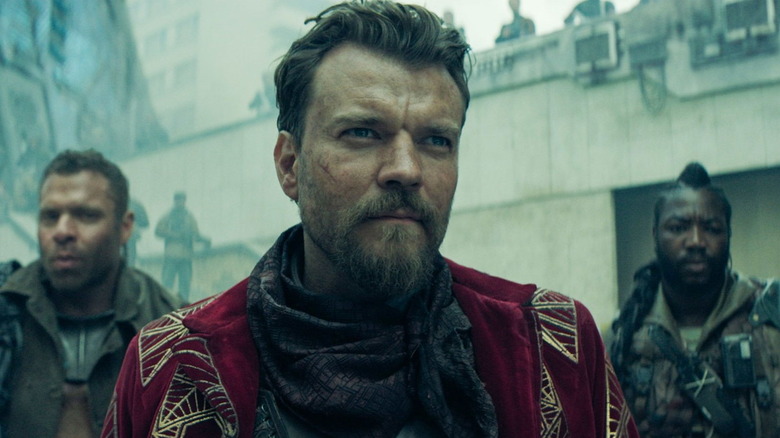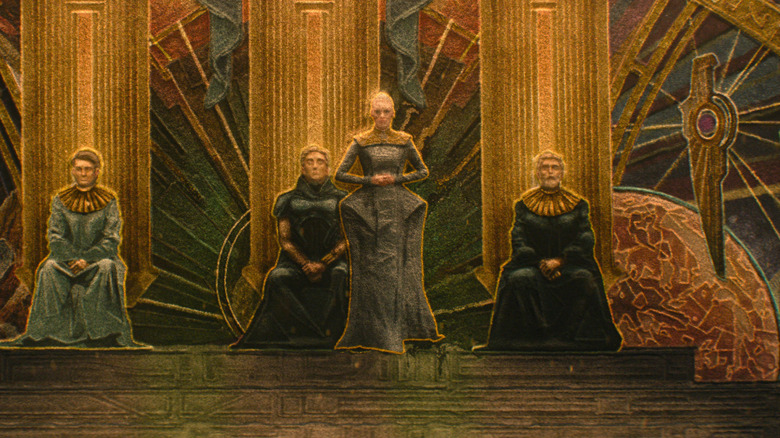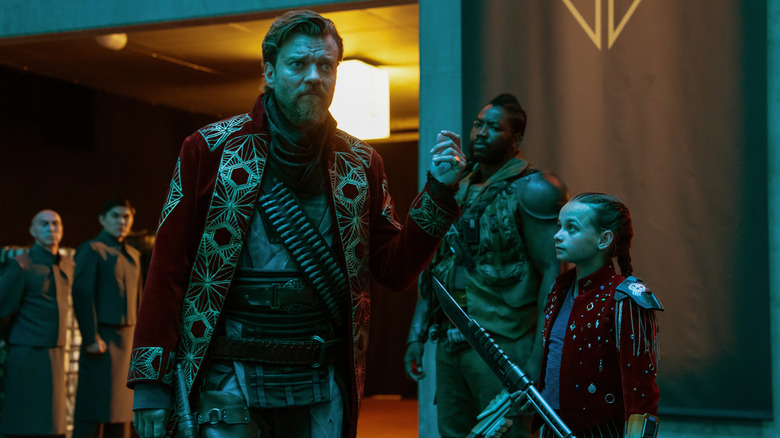How Apple TV+'s Foundation Changed The Mule's Backstory
This article contains spoilers for "Foundation" season 3, episode 7, "Foundation's End."
Apple TV+'s "Foundation" season 3 blew open the story of Hari Seldon, his fledgling pair of Foundations, and the falling Galactic Empire. After two seasons of setting the stage, the real throwdown arrived in the form of the Mule (Pilou Asbæk) — and I couldn't be more excited. The mind-controlling character showed up in the season's opening act, where he manipulated a global leader, turned an army against itself, and conquered a planet, all without lifting a finger. In episode 7, he uses his telepathic powers on the Foundation's capital planet of Terminus itself with terrifying effect.
And yet, the most disturbing part of the latest episode wasn't the conquest of Terminus. It was the way the episode started and ended with the Mule's backstory. It opens up on the distant Outer Reach planet of Rossem. (Side note: That name has an interesting link to author Isaac Asimov, too.) There, a young Mule is shown with his parents and newborn sibling. Local law enforcement officers arrive and discover the child, revealing to the viewers that there is a strict embargo on multi-child families.
By the end of the episode, the harrowing story comes to a terrifying conclusion as the Mule's father attempts to drown him to stay within the legal limits of family sizes. This unlocks the budding villain's mentalic powers and leads him to murder his parents in a shocking blend of self-defense and cold blood. The whole story explains why the Mule got to the point where he's casually conquering planets and reveling in his foes committing horrifying acts of violence and self-inflicted wounds under his control. But here's the fascinating thing: This terrifying galactic backwoods murder origin story is not the Mule's backstory from the books.
The Mule's book backstory is less chilling — but more important
Showrunner David S. Goyer has shown that he isn't afraid to make changes in his "Foundation" adaptation, and I get it. I've gone on record before agreeing with the common consensus that this book series (which I've read through twice in recent years) is unadaptable. Creative decisions and artistic license were inevitable in any adaptation. Even so, season 3 has had some of the biggest changes of all, including major alterations to the Mule. One of these is separating his character from that of Magnifico Giganticus. In the books, the Mule masquerades as Magnifico as he tries to sneakily discover the Second Foundation, but in the show, they're treating them as separate characters for a cleaner storyline. Again, I get it. It's a different medium, you have limited time, yadda yadda. But this fundamental change to the Mule's backstory puzzles me a bit. Here's why.
In the books, the Mule comes from an utterly unique planet called Gaia. The humans living there were guided by robots for centuries as they developed mentalic abilities and then melded them into a collective force that includes the entire planet. Gaia is a critical part of the Foundation story later on, but for our purposes here, in the book "Foundation's Edge," it's revealed that the Mule came from Gaia.
The Mule is a Gaian rebel
Shortly after we discover Gaiai in the books, an inhabitant named Dom explains:
"[The Mule] was an aberrant and he left us. We were naïve enough to think that was not possible, so we did not act in time to stop him. Then, when we turned our attention to the Outside Worlds, we became aware of what you call the Second Foundation and we left it to them."
Here's where I get a little stuck with this change. The Rossem version of the Mule's origin works for season 3, but its impact won't go beyond the Mule's storyline. Once that villain is overcome, his start on a backwater agricultural planet won't matter much. In the books, linking the Mule to Gaia creates a greater sense of continuity across the entire story as the mentalic single-organism planet comes into focus later on.
It feels like a missed opportunity, but I'm sure there were reasons for the change. Maybe the showrunners don't want to introduce Gaia yet. Maybe they're going to replace Gaia with Gaal and the Second Foundation to simplify the story (like the Mule/Magnifico split). Maybe they wanted to keep this season self-contained just in case the show isn't picked up for a fourth season. Whatever the reason, if we get more "Foundation" beyond season 3 (and no one wants that more than me), we can expect the spectacular raising of the stakes that we've seen in season 3 to just keep increasing moving forward. Buckle up, folks: The Second Foundation and the Mule are headed on a collision course, and if it makes the cut for this particular adaptation, Gaia probably won't be far behind.
"Foundation" is streaming on Apple TV+.


